New recording sneak peek and lessons from New York
In which I get into the interconnectedness of bigotry and make it about musical theater somehow
Lots of videos in today's post, so you know the drill; I recommend clicking through to view this post in your browser so you can play the embedded media, but also it's your life and I can't tell you what to do.
Hey! Next week is Fanny Mendelssohn Hensel’s 220th birthday, so obviously we gotta play her music, and I’ve got you covered.
Next Friday my recording of her Sonata in G Minor will come out on all the major streaming services (and be available to buy on iTunes), and I do hope that you’ll give it a listen. For now, here’s a lil sneak peek of the opening:
Those of you who have been around for a while may recall that when I was on Twitter I posted a thread in 2019 telling the story of Fanny’s life and musical career, and it was kind of a hit. I have locked down my Twitter, but last year I turned it into a blog post, which is easier to share and bookmark anyway. You can check it out here.
What New York City taught me
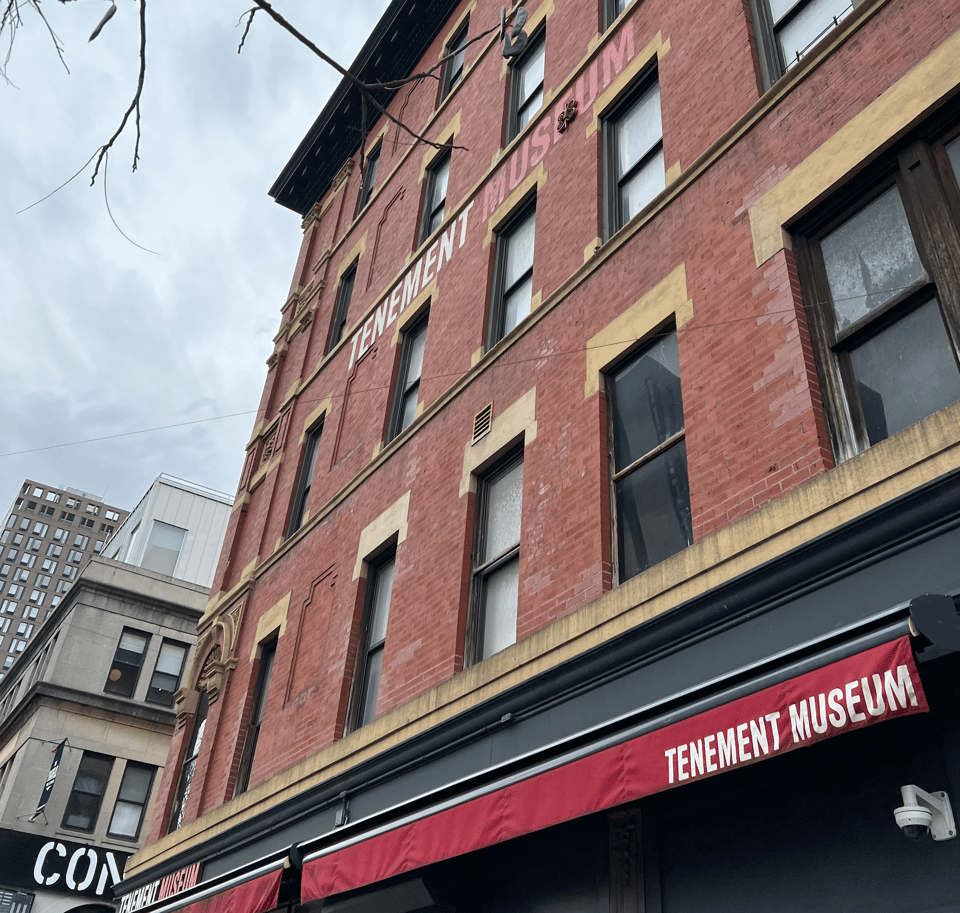
Ever since I learned that the Tenement Museum exists, I have wanted to go, and after several years of it not working out on one New York trip after another, I finally went in March of this year. Highly recommend to anyone into history, particularly if you, like me, believe that the lives of poor people in cities throughout history are just as fascinating as the lives of kings and queens in their castles.
The guide I had did a stellar job of putting things in context for us visitors; I toured an apartment representing an Irish family that emigrated after the Irish Potato Famine and landed in America smack dab in the middle of virulent anti-Irish racism. To help us understand just how bad the vibes were, the guide showed us a couple of political cartoons, including this one:
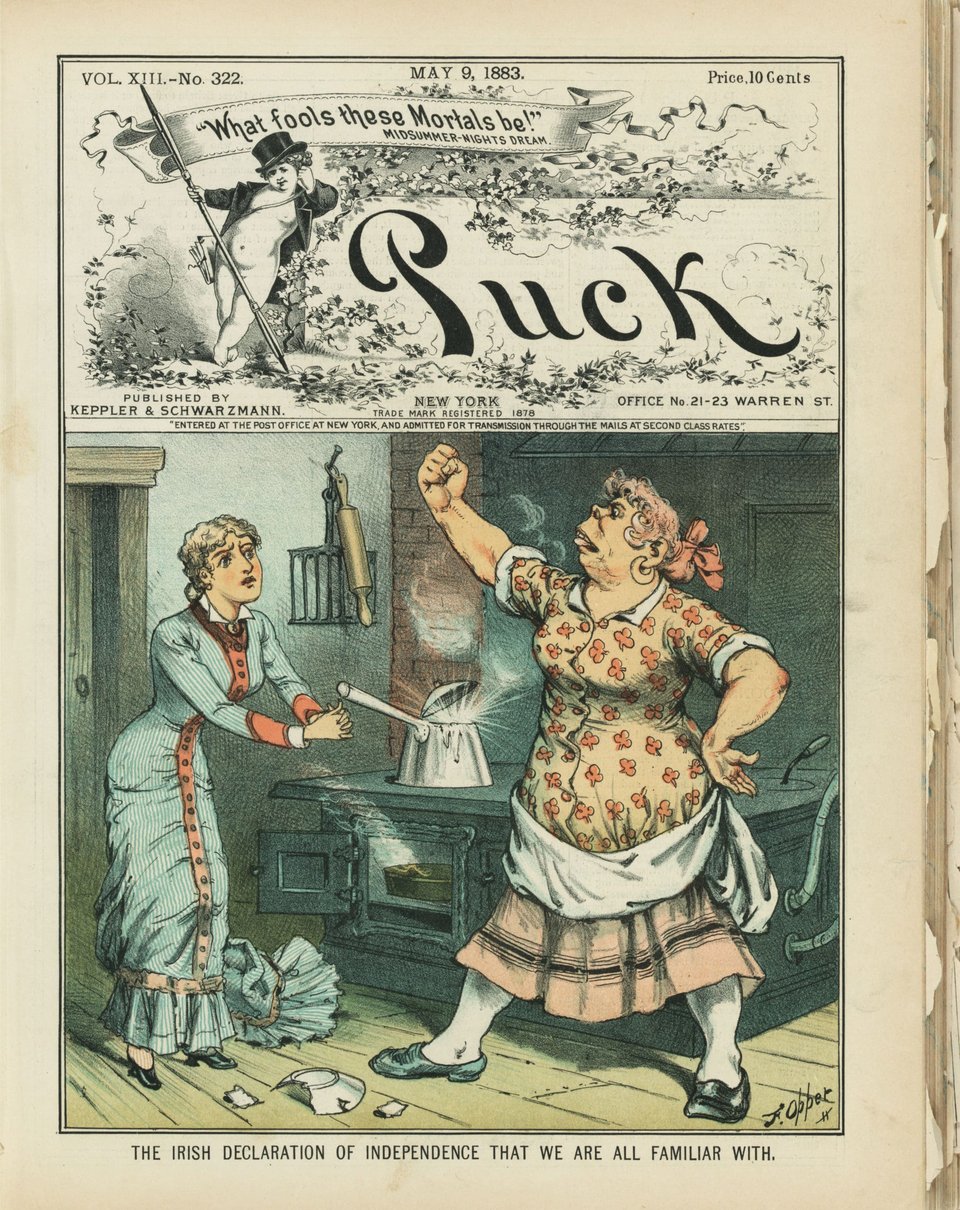
There’s a lot to unpack here, but one of the things that jumped out at me, looking at this racist-as-hell cartoon, was the sheer familiarity of what I was looking at. The Irish servant is the very picture of a too-masculine woman: ape-like face, so thick that Gaston is taking notes, brutish and uncontrolled—a violation, of course, of everything a woman (and therefore a human being) is supposed to be.
It’s always instructive for me to learn about racism in other settings than the one I personally experience—if nothing else, it’s a reminder that racist content is never actually about its target, but about the fragility and insecurity of its perpetrator. Looking at this cartoon from 1883, it’s clear than then, as now, attacking the innate (lack of) femininity or masculinity of a group is how you demonstrate that group’s fundamental inferiority.
Dehumanizing a race of people by pointing out how incapable they are of correctly performing gender is one of the oldest—and most effective—cheat codes in the bigotry playbook. We see it in the ways Black women are routinely characterized as angry and aggressive or how Asian men are frequently characterized as being effeminate and weak (a dynamic, by the way, that playwright David Henry Hwang exploits in his play M Butterfly, which I only just learned was made into a 1993 film starring a young hot Jeremy Irons).
Shortly after my visit to the Tenement Museum, I went to see Cabaret. More specifically, I saw Cabaret with Adam Lambert, Auli’i Cravalho, and Bebe Neuwirth, and yes that is a flex, and yes they were absolutely transcendent. Without getting too hyperbolic, it was maybe the best theater experience I’ve had in my life.
I’d already seen this particular production the year before in London, but the show hits even closer to home in 2025, in an era in this country where people unapologetically espousing Nazi beliefs are calling the shots in the federal government. The show, while giving us nonstop earworms, depicts the chilling rise of Nazism in Germany at the twilight of a brief era of expanded freedom for women and minorities and freer gender expression in Berlin. (It also, via the genius costuming of the Emcee in “Money,” draws a straight thematic line between the power of capital and the deathly hunger of empire. Who needs books explaining sociopolitical theory when you can just watch a killer performance and immediately understand the connection?)
These two only-in-NYC experiences in quick succession underlined, to me, the depressing cyclicity of history. It feels sometimes like we’re all trapped in a rondo played by an indifferent performer who is stuck and can’t get out; the A section is progress, the B section is base cruelty, and we’re all just going ABABABABABAB forever, doomed never to move onto C. We move forward, we’re dragged back, and we never learn our collective lessons and go through the process all over again.
If we have to be trapped in a rondo, I pick this one. This has nothing to do with anything I’m saying, I just wanted to share it.
I felt a dangerous glimmer of hope after Tuesday’s elections when transphobic tickets got absolutely walloped up and down the country. Zohran Mamdani pledged his support for trans people outright and a record-shattering number of New Yorkers made him their next mayor. Virulently anti-trans candidates had their butts absolutely handed to them and lost their races for governorships of Virginia and New Jersey. John Ewing stood with LGBTQ+ folks and defeated a purportedly unbeatable candidate to become the next mayor of Omaha in a deeply red state. Every single one of the loudly anti-LGBTQ+ Moms for Liberty candidates in a contested race lost their school board election.
Sure, there are other factors at play, and sure, at this moment people displeased with the current state of affairs—which numbers suggest are currently the majority—are going to vote blue no matter what. And I’m not going to argue that trans panic is the single defining issue of our time with [gestures] everything else going on, but I will posit that it’s a critical bellwether for where our communal values are and whether we pass the test of basic decency. To quote another Broadway show I had a phenomenal experience with in New York:
Orpheus: It’s not a trick?
Hermes: No, it’s a test.
Sex/gender is one of fascism’s favorite battlegrounds—it’s why so many ginned-up culture war issues are rooted in gender controversies. Bigots, and even people with “moderate” views who would never be identified as straight-up bigots, hold the worldview that some people are born superior to others. (Or, as George Orwell satirized in Animal Farm, “All animals are equal, but some are more equal than others.”)
To a disconcertingly large number of people, the ideal society is a pyramid of power, with kings at the top ruling lesser nobles ruling subjects, all the way down to husbands ruling their wives, with each level fighting like crabs in a bucket for scraps from the level above them. It’s why Mary Wollstonecraft—in 1792—astutely noted that until arbitrary hierarchical structures of power at the top of society (and she was talking, at the time, about meritless aristocratic structures) are abolished, women will never have any shot at equality, because the dynamics between men and women reflect the power imbalances of society at large. She figured that connection out! In 1792! And here we are in 2025 still not getting it!
It’s why anything—oblique or explicit—that threatens the gender binary is a code red “Western Civilization is under attack” alarm to bigots, fascists, and anyone who subscribes to rigid hierarchical beliefs, regardless of class or religious belief. The anti-Irish cartoonist knew this, the Nazis knew this, and modern rightwing pundits with podcasts and Substacks know this. It’s why, in the same way that abortion was singled out as the perfect wedge issue to enable an eventual return to racial segregation, the existence of trans people has now been singled out as the perfect wedge issue to…enable an eventual return to racial segregation.
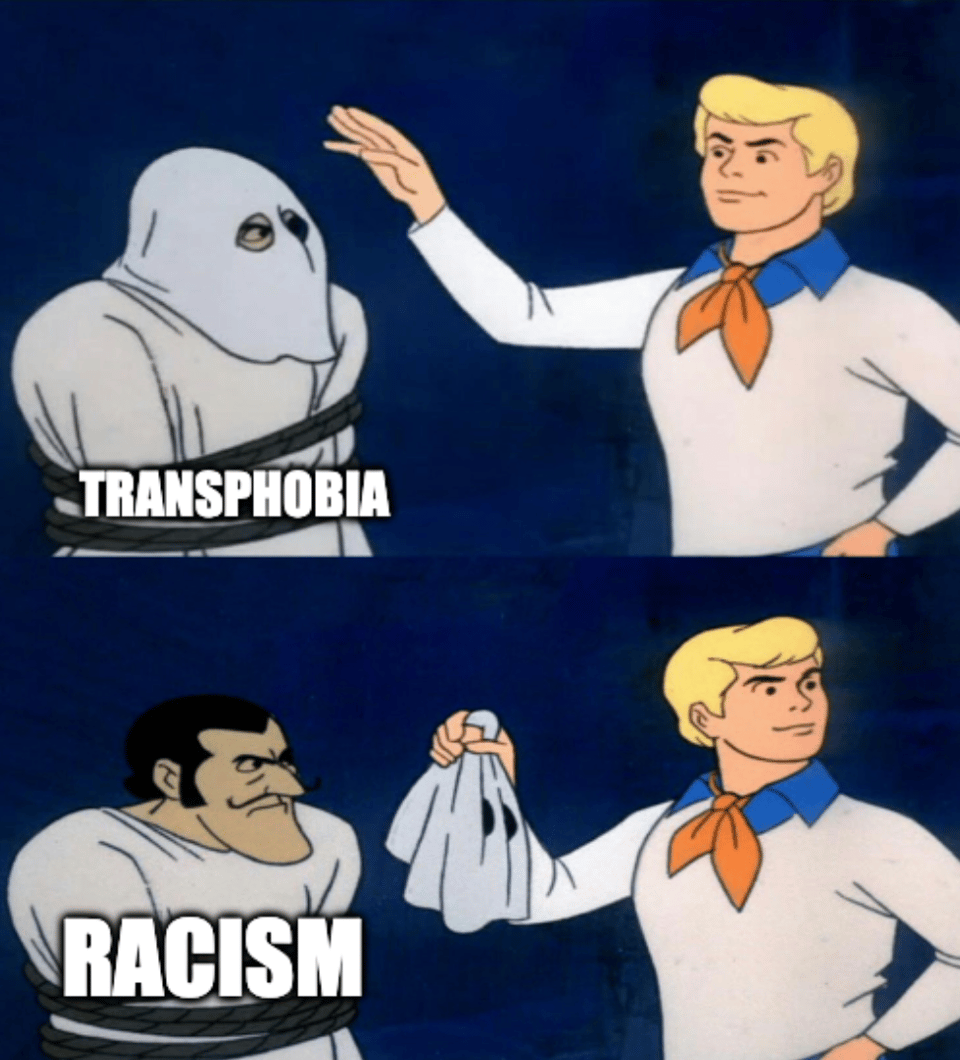
I’m sorry to keep bringing up Nazis, both because I am a child of the internet who learned early on to avoid invoking Godwin’s Law, and because Nazis are a real problem now and it’s very stressful to bring them up and remind everybody about them all the time. But the Nazis were huge on policing gender presentation; people who subscribe to strict hierarchical beliefs about the world always do. The Nazi feminine ideal, which informed policy, is an impossibly constrictive guideline that conveniently prohibited women from doing…pretty much anything other than popping out Aryan babies. (The bullet points of Kinder, Küche, Kirche read like an American evangelist’s wet dream.)
All of this is why the existence of queer, trans, and genderfluid/nonbinary people was so threatening to the Nazis, and continues to be threatening to wannabe fascists today. It’s why one of the first thing the Nazis did was destroy an institute dedicated to trans health and burn all its research and why they sent queer, trans, and gender nonconforming people to prison and concentration camps.
We see the same thing happening now with book bans, research defunding, and the fake crisis of—heaviest and most disdainful air quotes here—“boys in girls’ sports.” The last is so obviously a play to standardize tests that exclude black women from athletics—a thing that is already happening—and then defund women’s athletics altogether, thus opening the door to defund other women’s programs, that I feel like I’m going crazy when people fall for it and take the concern-trolling for girls’ sports at face value.
Transphobic policy and rhetoric is not going to stop at trans people. It never has. The Nazis didn’t hunt down queer and gender non-conforming people and then stop there; that was simply the beginning, not the end. Going after the most marginalized people in society who happen to not abide by strict gender binaries has always been, and remains still, the first step towards curtailed rights for everyone but a select few, and the removal of entire groups from public life.
If transphobia succeeds in becoming the norm, the next logical target is women’s freedom, rigidly enforcing what “real” women are meant to be (tradwives weren’t born in a vacuum), which of course delegitimizes minority groups because they will always be deemed incapable of performing womanhood or manhood correctly. Once again:
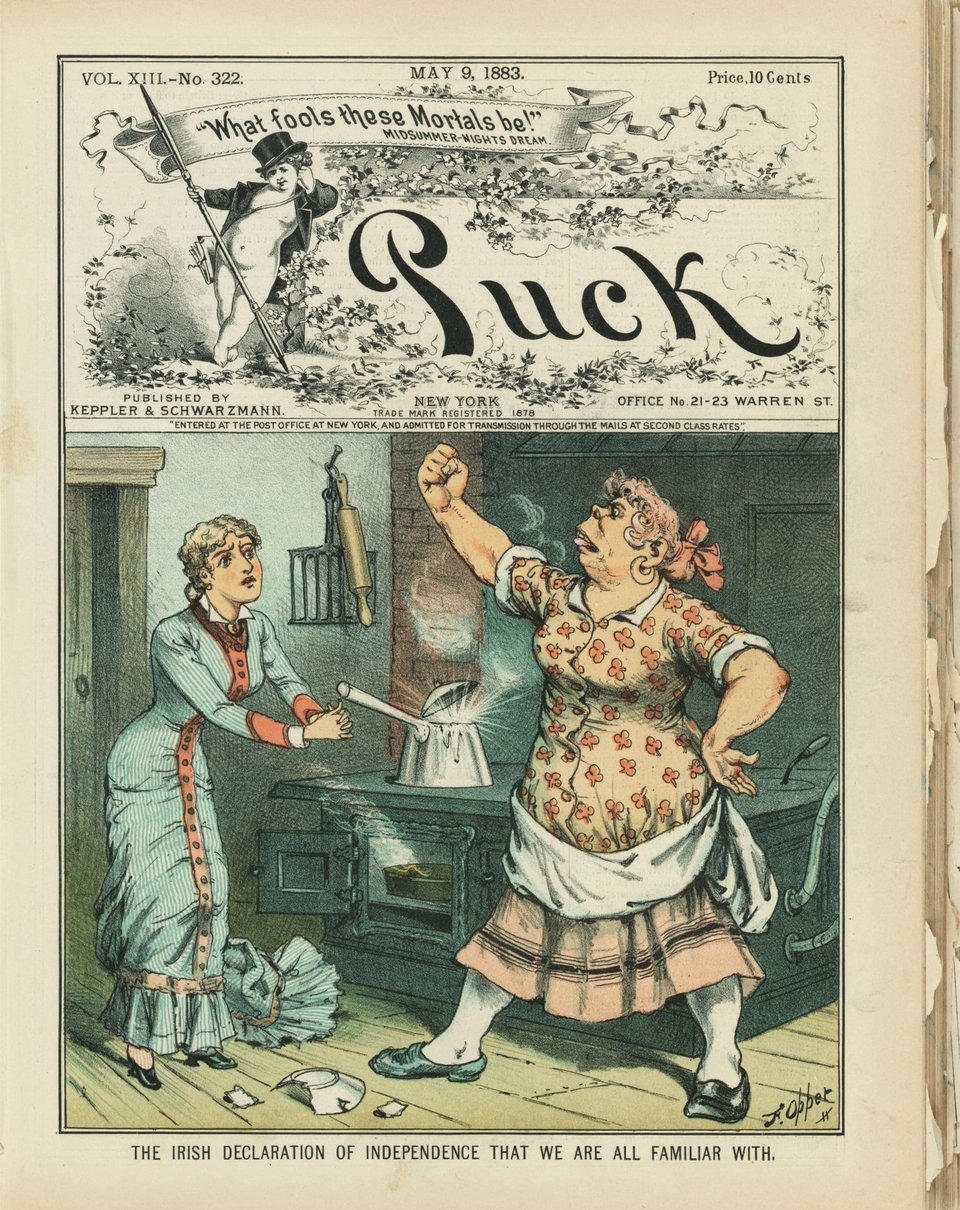
It’s why I—and hopefully you—have no choice but to go to the mat for trans, nonbinary, and queer folks.
Before I write the next paragraph, I just want to get out of the way that my support for trans and nonbinary people is rooted in my personal belief that they are people inherently deserving of rights and dignity. (To quote Sally Bowles: “I think people are people, I really do […] Don’t you?”) I’m currently watching trans friends and strangers alike suffering completely needlessly, all because a small group of very close-minded people are intent on inflicting their misery on the rest of us, and that disturbs me.
But let’s say, for a moment, that I didn’t actually care about other people. Let’s say I was completely and utterly self-interested and only looking out for myself. In that case, it would still be in my best interest to defend trans folks and their rights, because transphobia is a Trojan horse stuffed with misogyny and racism instead of sweaty Greek soldiers. As someone not set up to exist happily in an environment that would deem me less than human, it would be idiotic for me to think I’d be safe from the vector of bigotry. The cannon is still pointed in my direction even if there’s currently another person standing between it and me.
(Did I just reverse-engineer the “First they came for” poem? Yes, I suppose I just did.)
At my most selfish and self-serving, I simply don’t want a future in which I have no choice but to be Cabaret’s Frau Schneider.
What I hope we take from this week’s elections (which the cynic in me is not particularly optimistic about) is that there is no middle ground on policy or rhetoric that is fundamentally rooted in the idea that some people by virtue of their identity are more deserving of rights than others. Trans rights—as with the rights of women, people of color, the poor, the disabled, and the unhoused—are not a losing argument unless you act like they are. The last decade should have shown us that; we’ve seen, again and again, the fringe of a party taking unthinkable stances and saying things once deemed political suicide—and continuing to win because they learned that if you don’t feel shame, you can do anything.
“What does any of this have to do with music,” some of you who have stayed with me through the previous almost-2000 words may be asking at this point. “I thought this was a classical musician’s newsletter about classical music but here you are talking about politics and transphobia?”
I’m glad you asked, imaginary impatient reader!
If you haven’t noticed, a fundamental part of who I am as a person, which informs the choices I make as an artist, is that I don’t believe identity should constrict our opportunities. Those of you who have seen my work for the past couple of years may have noticed that I’m particularly enthusiastic about showing that the primarily all-male, all-white western canon of classical music is not representative of the reality of who was actually creating wonderful art over the course of centuries of human existence.
If you believe, as I do, that the seeds of talent can be found in anyone in the world—not just the privileged—and you have seen, as I have, how any number of avoidable societal roadblocks can kill the chance for something to come of that talent, then you will want a better world more hospitable to the spectrum of human expression. No initiative, however well-funded or -intentioned, can ever correct for the fact that if a fledgling potential artist is forced to spend their precious energy fighting to exist, society robs itself of the artistic gifts that person could have given. (Putting aside the fact that all people deserve rights and safety regardless of what they do or don’t produce, of course, but if we already all believed in that we wouldn’t have to have this conversation at all.)
You know who gets it? Elton John and the producers of Billy Elliot (which, if you’re not familiar, juxtaposes the struggles of the working class with children’s explorations of gender expression—both the film and the musical do this and god, I love art for exploring themes like this).
This is why I can’t be a Serious Culture Essayist—instead of backing up my arguments with statistical numbers, I like backing them up with musical theater numbers.
The desire to express and create is such an essential human trait—and if you don’t believe me, see all the wealthy people who have all their needs met and could live their entire lives in unbothered comfort who still feel the inexplicable pull to make stuff. I would like to live in a world that recognizes this and incubates that desire for everyone, because in the end I am really very simple-minded and I like art and want more of it. That’s my ideal: a society that values creation over destruction.
We will never get to my ideal in my lifetime, which is why I will keep stubbornly making and consuming art while being mad at politicians. Art is how we make communion with other people who see the flaws of the world we live in and are not only able to articulate those flaws, but are also capable of envisioning a better world, and I never want to lose sight of the better things we can have.
My latest rabbit hole
I was going to share a bunch of the interesting stuff that I've been mentally and emotionally chewing on for the last few weeks, and then this newsletter got really long, which is my own damn fault, but also New York City's fault somehow. So for now I will share one (1) thing that sucked hours out of my life.
Recycled Movie Costumes is a blog that documents, with exacting nerdery, costumes from movies and TV shows that have been repurposed in other movies and TV shows. There are often detailed explanations getting into the weeds of how you can identify a reused costume by its stitching or spot functional alterations and it is amazing.
There is also a dedicated website if you're not a Tumblr person (we love self-hosted redundancy).
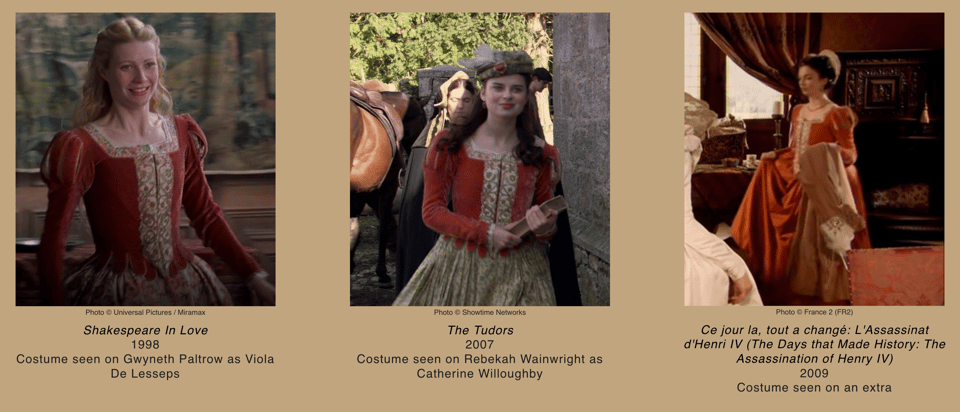
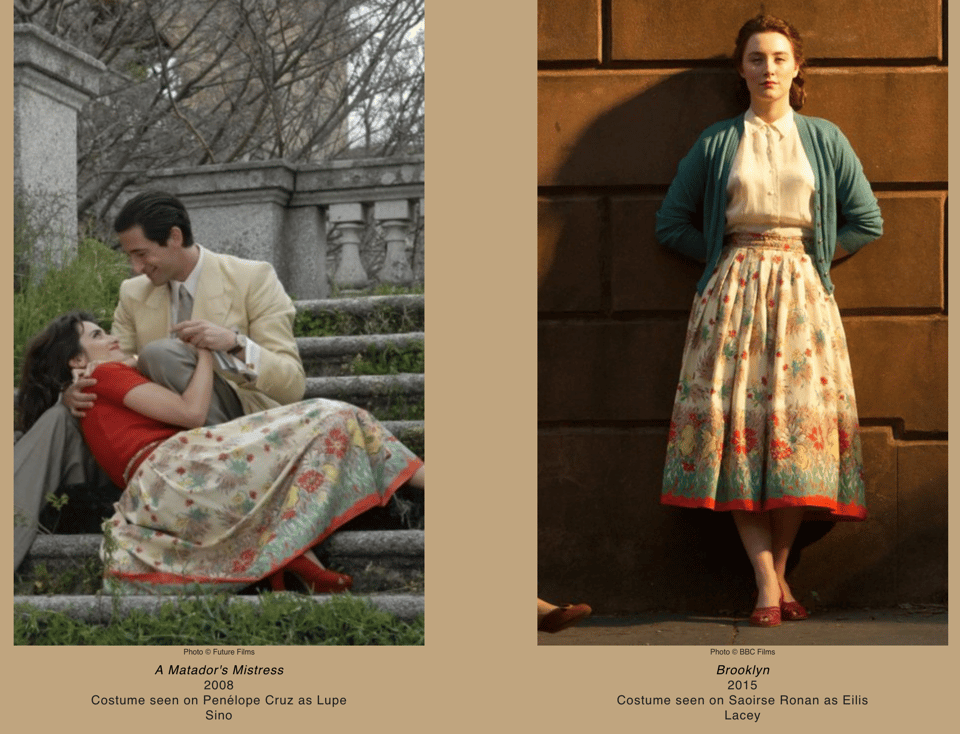
I cannot explain the chokehold this blog had on me. It manages to hit both my own special interests (clothes/costumes) and the part of me that loves seeing other people go full hog with their own special interests. The blog creator's post explaining how the site got started is so nerdy and delightful and reminds me, yet again, that the world is so great when it allows people to do their thing. 🎹
-
well, I was having the shittiest day until I started reading this, and particularly, playing your rondo extravaganza clip, which left me with a big smile on my face. so much music pouring out of your fingers into the piano!! Thanks for sharing your communicative gifts. I'd write more but it would just be babbling. Brava.
-
↳ In reply to Sharon Su
well, apologies for the confusion; I couldn't see thru Ms Wang's hair to make a positive facial ID. On the other hand, I've heard your rendering of the Florence Price, so what I wrote about her (as it turns out), applies to you as well! All that music, pouring out of those fingers, it is a miraculous thing. And again, brava to you.

Add a comment: